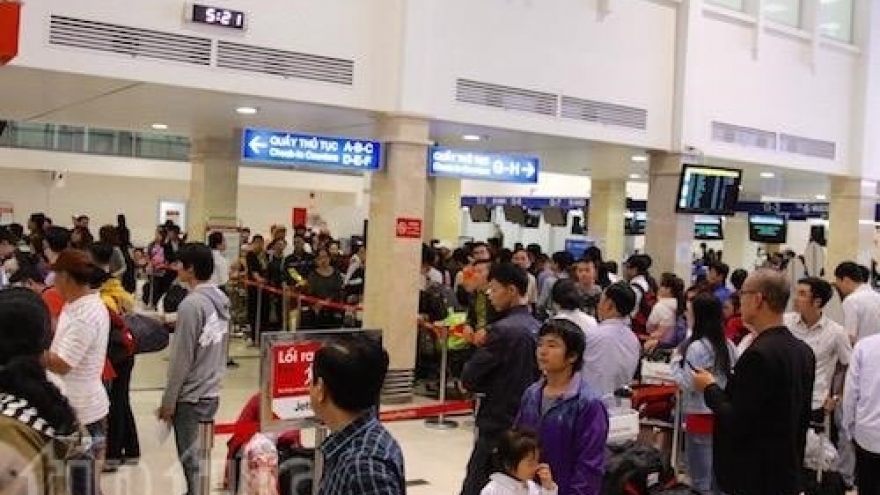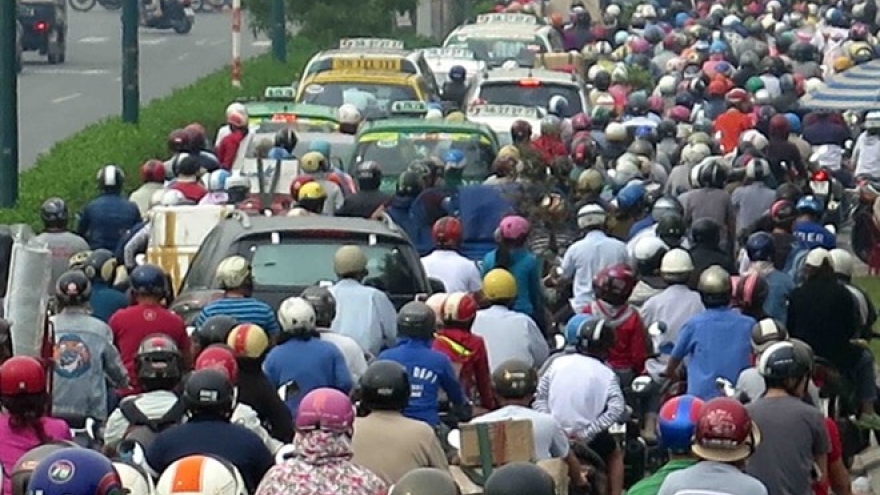Planning row engulfs expansion of Vietnam's largest airport
The French consulting firm hired by Vietnam’s transport ministry to forecast the demand at the country's largest airport has said it should be prepared to handle 51 million passengers and one million tons of cargo per year by 2025.
Tan Son Nhat Airport in Ho Chi Minh City already handles 36 million passengers per year, way above its design capacity, according to ADPi Engineering.
ADPi has proposed enlarging the airport but limiting its capacity to 50 million passengers by 2025 to avoid the need for a new runway. It said the construction of a new runway would be expensive and cause increased environmental and noise pollution.
 |
Instead the company has proposed building a new terminal with a capacity of 20 million passengers to the south of the airport, and more cargo terminals and plane maintenance facilities to the north.
Under the proposal, the expansion would cost over VND30 trillion (US$1.3 billion), excluding site clearance costs, ADPi estimated.
The proposal is similar to one made by the defense ministry’s Airport Design and Construction Company (ADCC), which also included new terminals, parking areas and technical facilities, while leaving out the construction of a new runway. Under ADCC's proposal, the expansion would need 24 hectares of land currently controlled by the defense ministry, and would cost VND19 trillion (US$830 million). The proposed expansion would take 2-3 years and would increase the airport's capacity to 43-45 million passengers per year.
Opposite views
Dr Nguyen Thien Tong, former head of the Department of Aviation Technology under the Technology University of Ho Chi Minh City, said the city wants to expand Tan Son Nhat Airport to the north, regardless of if there's a new runway or not.
Around 157 hectares of land controlled by the defense ministry lies to the north of the airport, including a golf course.
The location is suitable for transport connections and the construction of more terminals, explained Tong, who is member of an expert group set up by Ho Chi Minh City's Party leader Nguyen Thien Nhan to advise the city on the expansion of Tan Son Nhat.
The group has submitted two proposals to the Prime Minister for consideration. Under the first proposal, no new runways would be built. Under the second proposal, a third runway would be constructed. However, both proposals suggest expanding the airport to the north, he said.
“The proposal compiled by Ho Chi Minh City differs from the one put forward by the French consultant, but both proposals should be considered,” Tong said, without mentioning the proposal commissioned by the defense ministry.
Under Ho Chi Minh City’s proposal, Vietnam should build a third terminal with capacity of 10 million passengers from 2018- 2020, and a fourth terminal with capacity of 20 million passengers from 2020-2022, raising the airport’s combined capacity to 55 million passengers. It should then construct a third runway and expand the fourth terminal from 2022-2025, increasing the airport’s capacity to 70 million passengers.
The clock is ticking
However, ADPi said that massive expansion would be too costly and unnecessary as the country already plans to build Long Thanh Airport in the neighboring province of Dong Nai.
To increase Tan Son Nhat’s annual capacity to 60-70 million passengers, Vietnam would need to build a new runway and a terminal with a capacity of 30-40 million people, which would cost VND35 trillion (US$1.54 billion), excluding site clearance costs, acording to ADPi.
Echoing ADPi at a meeting with the Ministry of Transport on February 27, experts said the construction of a new runway would be too costly, and that site clearance and relocation for thousands of households alone would cost some VND45 trillion (US$1.98 billion).
Long Thanh Airport is expected to go into operation in 2025 and help ease the pressure on Tan Son Nhat, ADPi said.
Long Thanh Airport, which will cover 5,000 hectares (12,400 acres), is expected to replace Tan Son Nhat as the country’s largest airport with an annual capacity of 100 million passengers and five million tons of cargo. The first part is scheduled for completion in 2025 and will be able to handle 25 million passengers a year.
But Tong said there are no guarantees that Long Thanh will go into operation in 2025 as planned.
Despite the airport being approved by the National Assembly two years ago, no feasibilty studies have been conducted, so we don't know where funding for the airport will come from, Tong said.
“No one can guarantee that Long Thanh Airport will go into operation by 2025,” he noted.
If Long Thanh Airport is not put into operation by 2025, Tan Son Nhat needs to have a third runway to ensure it can serve 70 million passengers per year. The economic loss would be enormous if it's unable to do so, he added.
The transport ministry will collect relevant opinions from consulting groups on the matter and report them to Deputy Prime Minister Trinh Dinh Dung for consideration before submitting to the government’s standing committee for final decision later this month.
Covering 800 hectares, Tan Son Nhat currently has two terminals that serve 32 million passengers annually, well above its design capacity of 25 million.
It also only has two runways that are sometimes closed due to flooding or lightning strikes. The airport has space for 57 aircraft at a time, but sometimes it has to handle more than 70.
Vietnam’s airline market is the third fastest growing in Asia-Pacific, and the country is grappling with a severe lack of airport capacity.
Vietnam’s aviation industry served 46.4 million passengers in 2017, up 14.1% over the previous year, according to the General Statistics Office.



